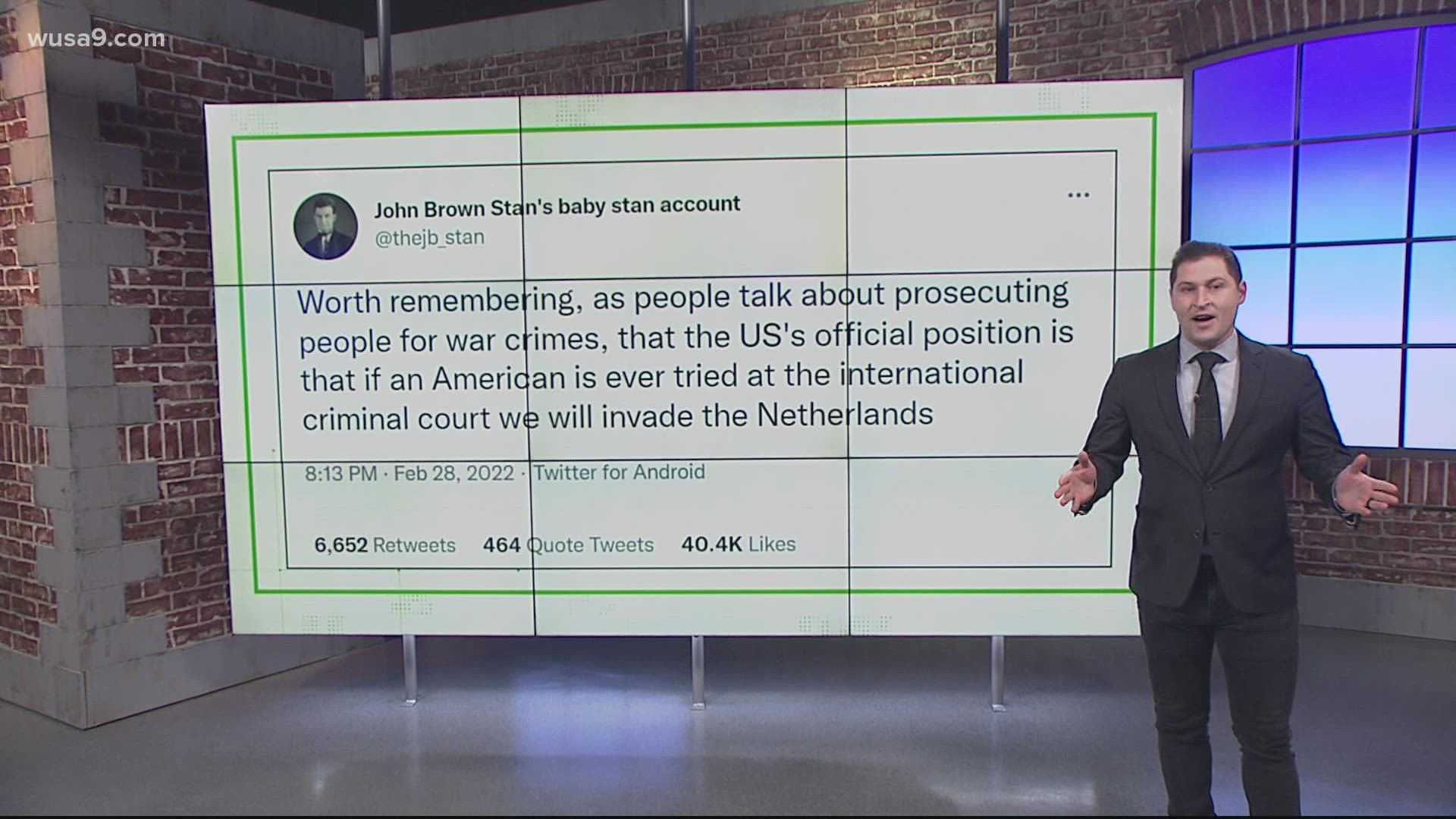WASHINGTON — Russia’s violent invasion of Ukraine has prompted the International Criminal Court to launch an investigation into the possibility that Russian senior officials may be responsible for war crimes, crimes against humanity or genocide.
But ahead of this announcement, a tweet was brought to VERIFY’s attention concerning the United States' stance on war crimes. It claims that “the US's official position is that if an American is ever tried at the international criminal court we will invade the Netherlands.” So we verified.
THE QUESTION
If an American is charged with a war crime, would the U.S. invade the Netherlands?
OUR SOURCES
- Laura Dickinson, Professor of Law, George Washington University
- Lawrence Douglas, Professor of Law, Jurisprudence, and Social Thought, Amherst College
- John Bellinger, adjunct senior fellow for international and national security law at the Council on Foreign Relations
- American Servicemembers' Protection Act of 2002
THE ANSWER
This claim is based on the American Service-Members' Protection Act, which authorizes the president to use “all means necessary and appropriate” to free any American detained or imprisoned by the ICC, which is based in The Hague, Netherlands. Some read this to be an authorization of force, so it is true, although not explicitly so.
WHAT WE FOUND
In 2002, Congress and then-President George W. Bush passed the bipartisan American Service-Members' Protection Act. It was quickly nicknamed the “Hague Invasion Act” by opponents, the list of which included the non-profit Human Rights Watch, because one statute of the act authorizes the U.S. president to free any Americans from The Hague, Netherlands by “all means necessary and appropriate.” Many read that line to include the authorization of use of force.
“This language is part of the reason this statute has been nicknamed The Hague Invasion Act, because some have read that to authorize the United States to use force in the event that the court were detaining U.S. nationals,” Dickinson explained. She told us she believes this reading is far-fetched, and Bellinger agreed.
“It's questionable, really, whether Congress was authorizing the use of force,” Bellinger said. “But whether Congress was or they weren't, I am confident that the vast majority, if not all, members of Congress, and certainly no president, has any intention of using force against our friends the Dutch to free any American.”
This is just one aspect of the American Service-Members' Protection Act, the entirety of which was passed with the intention of limiting future cooperation between the U.S. and the ICC. It was passed barely a year after the U.S. invaded Afghanistan as retaliation for the 9/11 attacks, which many countries disapproved of, so Congress passed this act to proactively protect themselves.
“This is kind of during the war against terror, and there was a fear that a nation would try to settle scores with American foreign policy by using the International Criminal Court in a politicized fashion,” Douglas explained.
“Some members of Congress were concerned that, even though the United States was not a party to the treaty, the International Criminal Court might assert jurisdiction and even try to prosecute American soldiers or officials, hence the title of the legislation, the American Service-Members’ Protection Act,” Bellinger said.
The act also bans state and local governments and agencies from cooperating with the court, prohibits the extradition of anyone from the U.S. to the court and restricts the U.S. from funding the court.
Despite these restrictions, Bellinger explained the act does still allow some wiggle room should the U.S. want to support the court in the future.
"It still does allow the U.S. to provide support intelligence or other support to the court if we think that it is operating appropriately," He said. "So I fully expect that...if we have intelligence about Russian war crimes, despite this very anti-ICC piece of legislation, we will have most members of Congress supportive of sharing that intelligence with the court pursuant to this exception."

